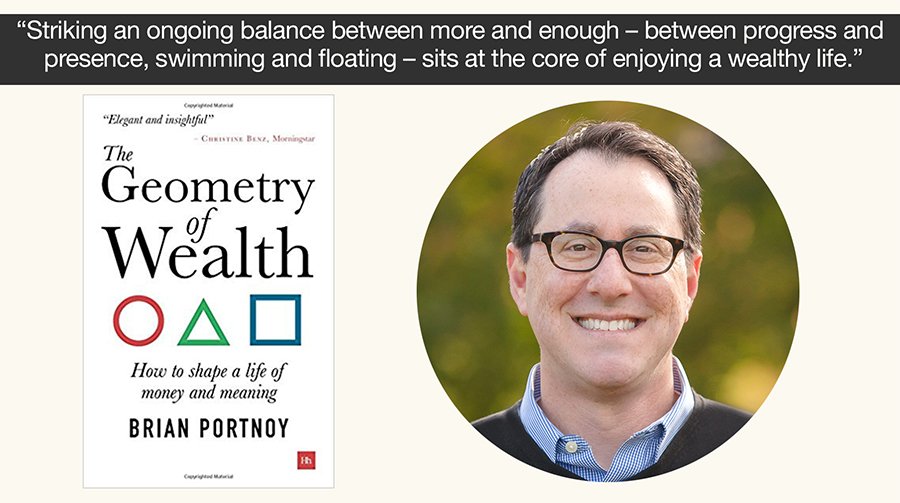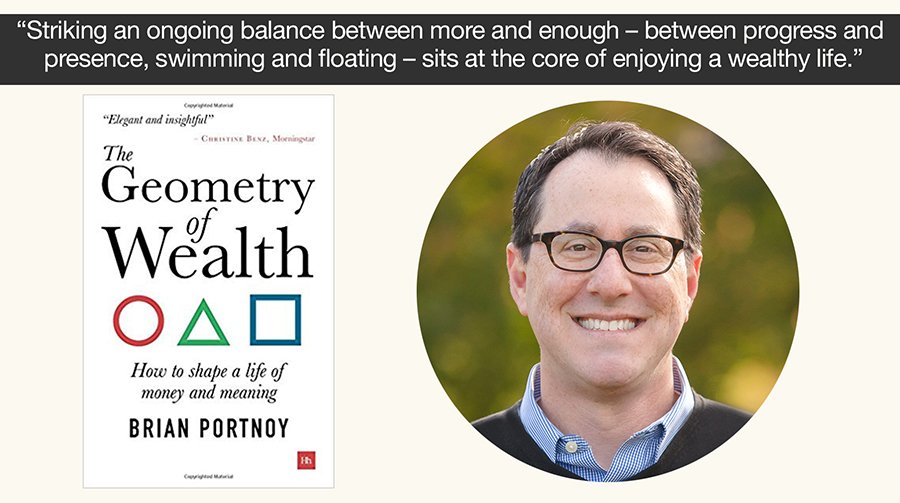
The Geometry of Wealth: How to shape a life of money and meaning

The Geometry of Wealth: How to shape a life of money and meaning
Last night I finished reading The Geometry of Wealth and wanted to share a few choice excerpts from this thoughtful book by behavioral finance expert Brian Portnoy.
A description of the book:
How does money figure into a happy life? In The Geometry of Wealth, behavioral finance expert Brian Portnoy delivers an inspired answer, building on the critical distinction between being rich and being wealthy. While one is an unsatisfying treadmill, the other is the ability to underwrite a meaningful life, however one chooses to define that. Truly viewed, wealth is funded contentment.
At the heart of this groundbreaking perspective, Portnoy takes readers on a journey toward wealth, informed by disciplines ranging from ancient history to modern neuroscience. He contends that tackling the big questions about a joyful life and tending to financial decisions are complementary, not separate, tasks.
Some key excerpts:
On money
Money…acts as the oil in the engine of everyday life.
There is so much subtext and hidden meaning wrapped up in money. Money is shorthand for happiness, power, and personal efficacy, so it can be very scary. ~ Psychologist Daniel Crosby
On simple vs. complex
Amid the overwhelming complexity of modern life, we seek to find simplicity, a break from the noise. Perversely, we are naturally attracted to the complex, especially in technically challenging domains like money…research suggests that the more information we gather, the worst choices we make.
In the context of our money lives, simplicity means having a limited number of clearly articulated concepts that both make sense of a noisy world and drive sharp, reasonable decisions; and an awareness that these concepts can weather the inevitable forces of change that disrupt even the best made plans.
On a meaningful life
…the content of a meaningful life. It anchors on a sense of belonging, a belief in the ability to control one’s own destiny, being good at a vocation you value, and feeling some sense of connection to something outside yourself.
On risk & our sensitivity to loss
Psychologists have found that our sensitivity to losses is about twice as much as it is to gains, a roughly 2:1 ratio.
…taking more risk increases the variability of future outcomes…the aim should be to control risk – taking enough, but not too much.
For our purposes, the primary goal with choosing the right stocks, bonds, or funds is to be less wrong.
…we should endeavor to think in terms of ranges of outcomes, versus pinpoint estimates.
Volatility is the emotional cost of achieving the growth we seek.
On gratitude
Psychologist Robert Emmons suggests that gratitude ‘implies humility,’ the recognition that we couldn’t have done it all by ourselves. Rather than a sign of weakness, it’s a validation of a positive connection to others.
On the magic of compounding
Charlie Munger explained: “The first rule of compounding: Never interrupt it unnecessarily.
On retirement
The shift from employment to retirement, from accumulation to decumulation, is hardly just the next stage of financial planning. It is also an existential reorientation, one in which people are confronted with a change in purpose. Motivations like competing, winning, and control yield to settling and accepting.
On a wealthy life
Striking an ongoing balance between more and enough – between progress and presence, swimming and floating – sits at the core of enjoying a wealthy life.
On humans
In one of his fabulous TED Talks, Harvard psychologist Daniel Gilbert observed, “Human beings are works in progress that mistakenly think they’re finished.
 SAGE Serendipity: A friend recently posted this oldie but goody: Your Phone Is Listening and it’s Not Paranoia, Here’s how I got to bottom of the ads-coinciding-with-conversations mystery. Really, it’s not your imagination!
SAGE Serendipity: A friend recently posted this oldie but goody: Your Phone Is Listening and it’s Not Paranoia, Here’s how I got to bottom of the ads-coinciding-with-conversations mystery. Really, it’s not your imagination!
 Secure Document Sharing
Secure Document Sharing


